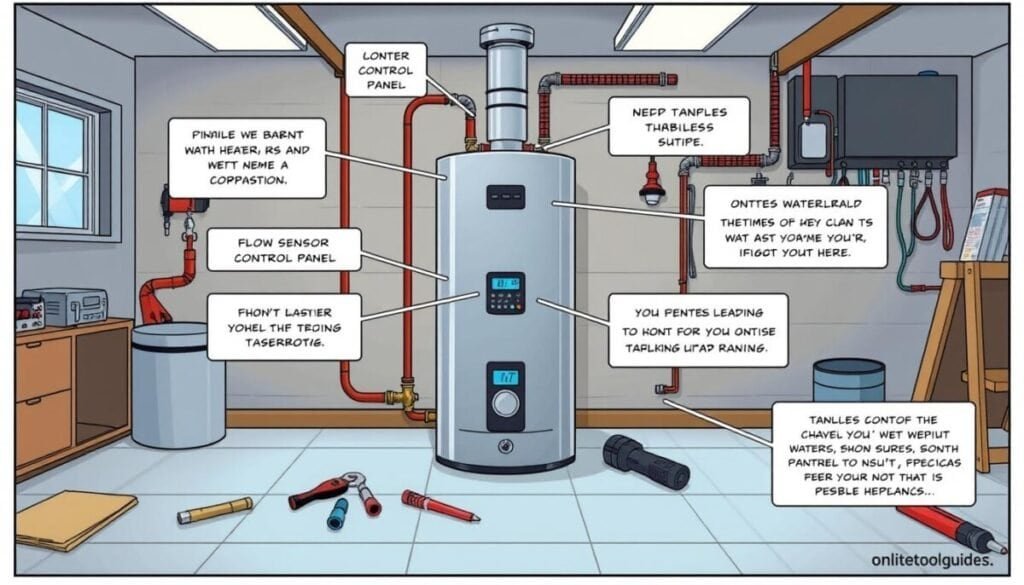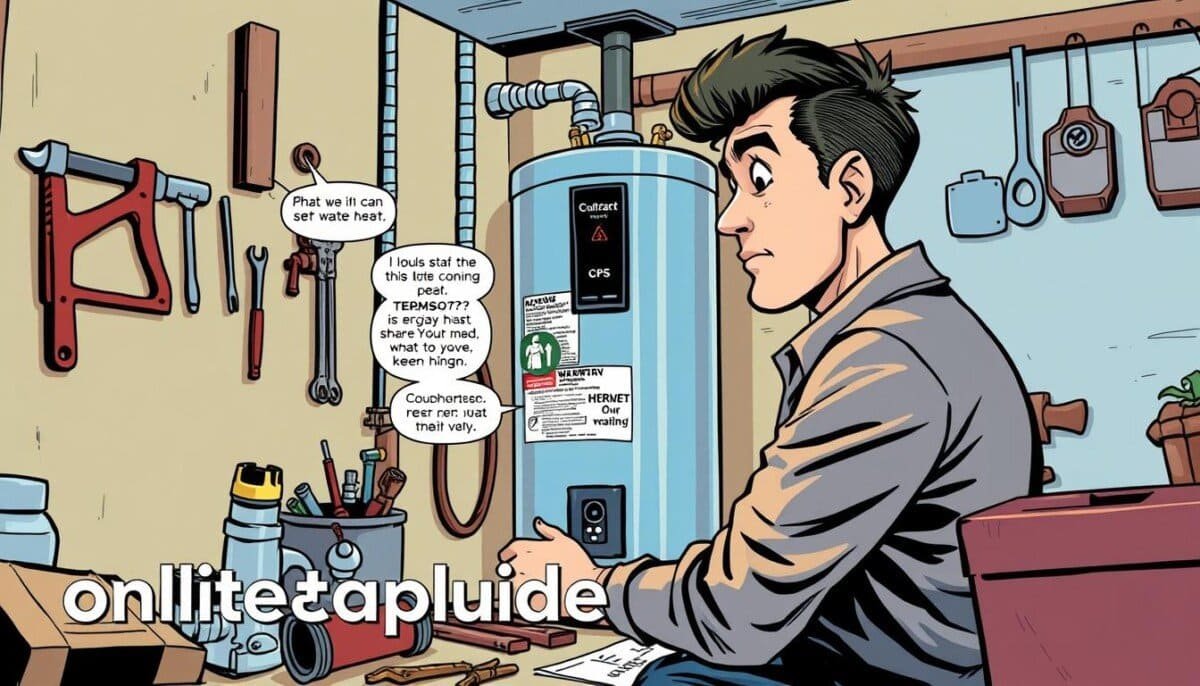Did you know the U.S. Department of Energy suggests setting your water heater to 120° F? This keeps you safe and saves energy. Knowing how to fix water heater problems is key for hot water all day.
Keeping your water heater in good shape saves you money and time. Flushing it once a year stops mineral buildup and keeps water pressure high. This guide will teach you how to manage your water heater well.
Check your water heater’s health as you read. See if you can fix problems yourself or if you need a pro. Simple care now can save you from big repairs later.
Key Takeaways
- Set the water heater thermostat to 120° F for safety and efficiency.
- Regularly flush your tank water heater to prevent mineral buildup.
- Be vigilant about signs of corrosion or leaks in your water heater.
- Recognize when it’s time to call for professional repair assistance.
- Maintain proper venting for tankless water heaters to ensure optimal performance.
- Address unusual noises promptly to avoid further damage.
Common Water Heater Problems
It’s important to know about water heater issues for good maintenance and quick fixes. This part talks about three big problems: no hot water, not enough hot water, and strange noises. We’ll look at what causes these and how to fix them.
No Hot Water
Many people face the problem of no hot water. Electric water heaters might have broken heating elements. This means you might need a pro to fix or replace it.
Gas water heaters can have issues too. Maybe the pilot light went out, or the burner isn’t working right. Or, the gas line might be frozen. Finding out what’s wrong with gas water heaters needs a skilled eye.
Insufficient Hot Water
Not enough hot water can be due to sediment in the tank. This makes the heater work less well. To fix this, you should clean out the tank regularly.
If hot water runs out fast, it might be because the lower heating element is broken. A pro should replace it. This helps keep the heater working well and stops leaks from too much sediment.
Unusual Noises
Strange sounds from your water heater can be a worry. Sounds like rumbling or popping might mean there’s sediment or it’s overheating. Cleaning the tank can solve these problems and make it work right again.
Keeping your water heater in good shape is key. Regular checks and cleanings can stop noise and make it last longer. This helps catch and fix sediment problems early.
| Problem | Common Cause | Possible Solution |
|---|---|---|
| No Hot Water | Heating element failure, pilot light issues | Professional repair or replacement |
| Insufficient Hot Water | Sediment buildup, defective heating element | Regular tank flushing, component replacement |
| Unusual Noises | Overheating, sediment accumulation | Flushing the tank |
Identifying the Type of Water Heater
It’s key to know what kind of water heater you have. This helps with fixing and keeping it running well. Knowing if it’s a tank or tankless, and if it’s electric or gas, makes a big difference.
Tank vs. Tankless Water Heaters
Tank water heaters hold a set amount of hot water. Tankless ones heat water as you need it. Each has its own needs for fixing problems:
- Tank Water Heaters: They can get clogged with sediment, which slows them down. Keeping them clean is important.
- Tankless Water Heaters: They save energy by not wasting it when not in use. Fixing them often means looking at flow and power.

Electric vs. Gas Water Heaters
Electric and gas water heaters work differently and need different care:
| Aspect | Electric Water Heaters | Gas Water Heaters |
|---|---|---|
| Power Source | Uses electric connections and heating elements | Has burner systems with pilot lights |
| Common Issues | Thermostat problems, heating element issues | Ignition troubles, gas leaks |
| Maintenance Needs | Check electrical connections, water quality | Look at burners and gas lines |
| Efficiency | Reduces energy waste with electric | Heats faster but might pollute more |
Choosing the right water heater during Water Heater Installation is crucial. Knowing if it’s electric or gas helps fix it better.
Basic Troubleshooting Steps
Fixing water heater problems needs a step-by-step plan. These basic steps can help find common issues. They also improve water heater care. Fixing problems early can avoid expensive repairs later.
Check the Thermostat Settings
Make sure the thermostat is set between 120°F and 140°F. If hot water runs out fast, it might be a bad lower heating element or wrong settings. Changing the thermostat can fix lukewarm water issues.
Inspect the Power Supply
For electric models, check the circuit breaker for tripped switches. Resetting it can fix the problem. If there’s no hot water, checking the power supply is key for fixing issues.
Examine the Vents and Exhaust
Gas heaters need good venting. Make sure vents and exhausts are clear and not damaged. Keeping these parts in good shape is important for safe and efficient water heating. Regular checks can stop big problems before they start.
| Step | Purpose | Common Issues |
|---|---|---|
| Check Thermostat | Ensures optimal temperature settings | No hot water, lukewarm water |
| Inspect Power Supply | Confirms electrical functionality | No hot water, tripped circuit |
| Examine Vents | Maintains safe gas operation | Blocked exhaust, reduced efficiency |
Maintenance Tips for Water Heaters
Keeping your water heater in good shape is key. A few easy steps can save you money and make it work better.
Regular Flushing
Flushing your water heater regularly stops sediment buildup. Do it once or twice a year. This keeps it running smoothly and saves energy.
Anode Rod Replacement
The anode rod fights rust and corrosion inside your water heater. Check it every three to five years. If it’s corroded, replace it fast to keep your heater going strong.
Insulation and Energy Efficiency
Insulating your water heater and hot water pipes helps a lot. It can cut down on heat loss by 25% to 45%. Lowering the thermostat to 120°F saves energy and reduces burn risks. Reflective insulation can also cut down on heating costs.
When to Call a Professional
Many water heater problems can be fixed by homeowners. But, some issues need a pro’s help. Signs like leaks, discolored water, or strange smells mean trouble. For more complex issues such as faulty thermostats or broken heating elements, it’s best to hire a professional to avoid further damage. In a similar vein, if you’re experiencing performance issues with your computer, exploring **laptop overheating fixes** can prevent long-term problems. Regular maintenance, whether for your water heater or electronic devices, can prolong their lifespan and ensure optimal function.
Ignoring these signs can cause bigger problems. This includes corrosion or sediment buildup in the system.
Signs You Need Expert Help
Knowing when to call a pro is key. A noisy water heater might have sediment buildup. This means it needs a pro to check.
Cloudy or rusty water is another warning sign. In these cases, getting a pro for repair is important to avoid more damage.
Cost Considerations
It’s important to think about repair costs versus getting a new water heater. If your system is over ten years old, a new one might be better. Bad repairs can lead to bigger problems.
Getting a pro’s opinion is a good idea. They can help you decide what’s best.
Choosing a Qualified Technician
Choosing the right technician is crucial. Look for licensed and insured pros with good reputations. Check their experience with your water heater type.
A good technician keeps your system running well and safely. They can handle repairs or replacements effectively.



